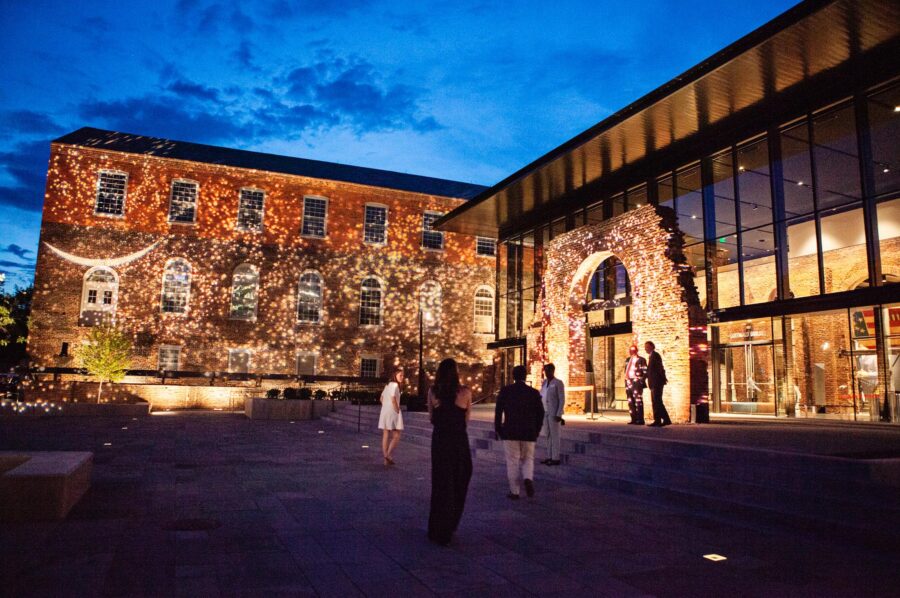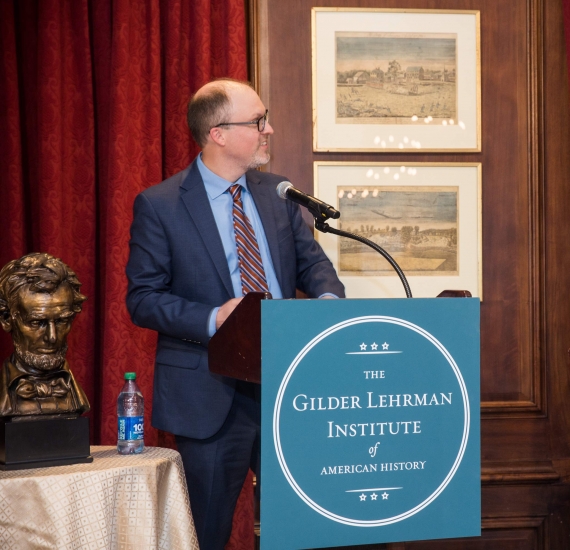
The American Civil War Museum
On October 26, 2023, The American Civil War Museum (ACWM), in partnership with the Gilder Lehrman Institute for American History, will host its first annual Lincoln Prize Lecture, where guests will hear from the winner of this year’s Lincoln Prize, which was awarded at a ceremony in New York City on April 11, 2023.
This year’s Gilder Lehrman Lincoln Prize—awarded annually for the finest scholarly work in English on Abraham Lincoln, the American Civil War soldier, or the American Civil War era—was co-awarded to Dr. Jonathan White for his book A House Built by Slaves: African American Visitors to the Lincoln White House (Rowman & Littlefield). White is a professor of American Studies at Christopher Newport University and author or editor of 13 books and more than 100 articles and essays. The co-laureate is Jon Meacham for his book And There Was Light: Abraham Lincoln and the American Struggle (Random House).
White will give a lecture and be joined on stage by historian Edward Ayers and American Civil War Museum President and CEO Rob Havers.
The event will be held at ACWM’s Tredegar site in Richmond, Virginia. In addition to White’s lecture, the evening will include a reception, moderated discussion, and book signing with Dr. White. For more information or to register visit acwm.org/event/lincoln-prize-lecture/.
We asked Lincoln Prize recipient Jonathan White and ACWM’s President and CEO Rob Havers questions about the award process and the upcoming lecture and dinner. Their answers follow.
So, what’s it like to win the Lincoln Prize?
Jonathan White: It’s a pretty surreal experience. Every time you write a book about Lincoln or the Civil War a part of you hopes it might be named a finalist for the Lincoln Prize, or maybe even win. I was a finalist in 2015 for Emancipation, the Union Army, and the Reelection of Abraham Lincoln. That was an incredible honor. But winning was something else—especially when I shared the honor with someone as famous and important as Jon Meacham. Attending the ceremony at the Harvard Club in New York City was really a thrill. My wife and daughters were there with me, and I suppose the best part was knowing how proud my little girls were to be there with their dad.

Dr. Jonathan White delivers his acceptance speech at this year’s Lincoln Prize award ceremony. (ILIR BAJRAKTARI)
What are the key lessons you hope readers will take away from A House Built By Slaves?
JW: I hope that readers can see Lincoln’s humility and authenticity in a new way. Prior to the Civil War it would have been unheard of for a president to welcome African Americans as guests at the White House. And Lincoln had nothing to gain politically by doing so. And yet he did. It’s a pretty remarkable story.
I’ve seen it mentioned that some of your students assisted you with the research for the book. How did that come about? What sort of role did they play?
JW: Several of my students worked as research assistants through Christopher Newport University’s Center for American Studies. For this project they mostly helped me by searching on newspapers.com and other databases for sources that I might not have known about. In other cases they worked on transcriptions of documents, and I even published two books with students listed as co-editors (and I have a third forthcoming). CNU students are wonderful to work with and their assistance definitely made A House Built By Slaves a better book.
Do you have your next book project lined up? If so, care to share any details?
JW: In August I published a book called Shipwrecked that uses the extraordinary story of a sailor named Appleton Oaksmith to explore the great lengths that Lincoln went to destroy the illegal transatlantic slave trade during the Civil War. In September I published an edited collection of essays called Final Resting Places: Reflections on the Meaning of Civil War Graves with Brian Matthew Jordan. Brian and I gathered 29 historians and each one picked a grave site that’s meaningful to them. It is one of the most beautiful books you could imagine, and the essays are really powerful. The writers show a personal side, giving wonderful new insight into how we think about the Civil War. In April 2024 I’m going to publish a children’s book called My Day with Abe Lincoln with Reedy Press. I’m really excited about this one—it’s about a third grader who travels back in time and meets a young Abraham Lincoln. The story is a lot of fun, but it’s rooted in years of research, so kids will learn a lot about Lincoln along the way.
* * *
How and why did the American Civil War Museum come to host its first-ever Lincoln Prize Lecture?
Rob Havers: The Lincoln Prize Lecture is the result of our new partnership with Gilder Lehrman Institute of American History, an organization that has done so much for the preservation, dissemination, and teaching of American history. The relationship between our institutions reflects ACWM’s commitment to preeminence in the study of the Civil War.

American Civil War Museum CEO Rob Havers
How does your partnership with the Gilder Lehrman Institute enhance your mission to promote the public’s understanding of the Civil War?
RH: Gilder Lehrman’s support of a greater understanding of the Civil War is substantial, and their annual Lincoln Prize award is one of, if not the, most prestigious awards in the field. An important part of the ACWM’s work is to understand the past as the past knew itself, not as we know it from the vantage point of today. That is the framework that guides our mission, and our partnership with Gilder Lehrman Institute of American History is reflective of that intention.
You will join White and historian Edward Ayers at this year’s event. Besides a discussion of White’s book, can you preview the topic(s) you are likely to discuss?
RH: Dr. White’s book, A House Built by Slaves, is sure to inspire a thought-provoking conversation on the topic of President Lincoln and the African-American population during the War. In line with the Museum’s multi-year initiative, “The Civil War and Remaking America,” the Lincoln Prize Lecture will provide a forum for discussion and analysis by leading scholars in the field of Civil War study.
What do you hope those attending might take away from the experience?
RH: As with all our programs, we hope to inspire a greater understanding of the American Civil War—its causes, course, and consequences. Accordingly, we engage the perspective of the foremost scholars in conversation and discussion. Our goal is to bring to a national stage the conversations that implore a look at the circumstances and perspectives of those who lived through the most pivotal point in U.S. history. The first annual Lincoln Prize Lecture will further that goal this year and for years to come.
What other programs do we have to look forward to in the coming months at the American Civil War Museum?
RH: Beginning with the Lincoln Prize Lecture, we continue this banner year for the ACWM. Now in year one of “The Civil War and Remaking America,” we explore causes of the war in a thorough manner. This year’s annual symposium on February 17 is also the opening day of our new, major exhibition “The Impending Crisis.” With the foundational question, “What caused the Civil War?”, “The Impending Crisis” symposium will engage national scholars and authors. The exhibit, by the same name, will explore the differing viewpoints from across the nation in pre-Civil War America. This new exhibit will provide a basis of understanding of what cause, what issue, could lead neighbor to raise their hand against neighbor in a war that was devastating to all.

